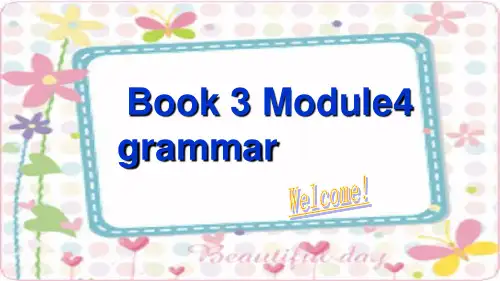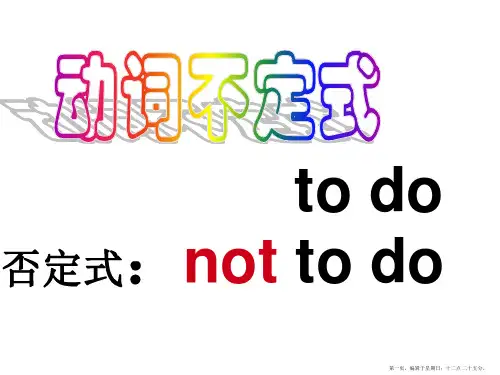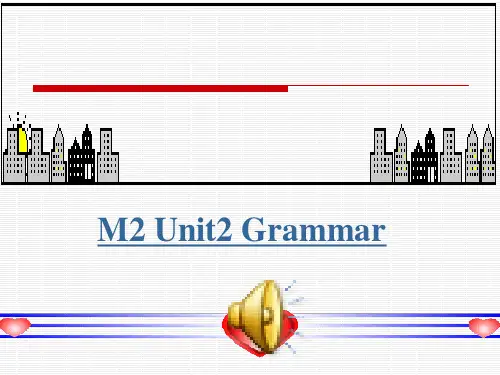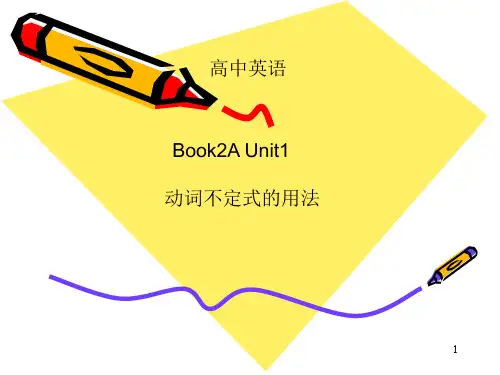- 1、下载文档前请自行甄别文档内容的完整性,平台不提供额外的编辑、内容补充、找答案等附加服务。
- 2、"仅部分预览"的文档,不可在线预览部分如存在完整性等问题,可反馈申请退款(可完整预览的文档不适用该条件!)。
- 3、如文档侵犯您的权益,请联系客服反馈,我们会尽快为您处理(人工客服工作时间:9:00-18:30)。
to say (say) one thing to healthy children,
it would be this: having a disability does not mean your life is not satisfying. 10 . Just accept them for who they are, and give them encouragement to live (live) as rich and full a life as you do.
• 练习 to be completd (complete) • 1. The airport _____________ next year will help promote tourism in this area. to do (do) • 2. Do you have anything ________ tonight?
• 学习下面句子,归纳用法。
• 1. They told him not to be late again. • 2. The parents don't allow their children to go out at night. • 3. She invited me to have dinner with her yesterday.
5 . My ambition is to work (work) for a firm that develops computer software when I grow up. 6. Last year I invented a computer football game and a big company has decided
• 1. 目的状语:to do/ in order to do/ so as to do • 2. 原因状语: sb. + be +表示心理状态的形容词 (sorry, happy, glad, surprised, eager, angry, disappointed等)+ to do
to buy (buy) it from me.
To look (look) after my pets properly takes a lot of time but I 7.________
find it worthwhile.
8. I have to work hard to live (live) a normal life but it has been worth it. 9.If I had a chance
to do和doing作主语的区别
1. 在许多情况下,两者可以互换。 To see is to believe. = Seeing is believing. 眼见为实。 2. 不定式做主语常表示具体的某次动作。 3. 动名词做主语常表示泛指的、经常性的动作。 To be a singer is my dream. Walking is good for your health.
All you have to do is (to) finish the job quickly. What I want to do is (to) go to bed.
如果主语部分含有实义动词do, 用作表语 的不定式可省略to。
• • • • • • • •
学习下面句子,归纳用法。 1. The driver failed to see the other car in time. 2. He can't afford to buy the expensive car. 3. I think it useful to learn a foreign language. 4. I feel it my duty to say that you are wrong. 归纳三: 1. 不定式作宾语,常跟在某些动词后。 decide/determine, learn, choose, plan, refuse, promise, want/attempt, pretend, offer, manage, expect/wish/hope, agree, ask/beg, help, prepare, threaten, tend, claim, desire/long, apply, fail, hesitate
• 归纳五: • 不定式常放在名词或不定代词后面作后置定语。 • 1. 名词前有the first, the last, the only等词以及最高 级修饰时。 • 2. 抽象名词way, chance, ability, desire, determination, decision, plan等后面。 • 3. 用在have sth. to do句型中。
动词不定式的语法功能 Functions of Infinitive 1 主语 (subject) 2 表语 (predicative) 3 宾语 (object) 4 宾补 (object complement) 5 定语 (attribute) 6 状语句子,归纳用法。 • 1. To do morning exercises is useful for our health. • 2. It is useful for our health to do morning exercises. • 归纳一: • 不定式作主语,表示具体的某次动作。若不定式结 构比较复杂,常用it 作形式主语,真正的主语放在 句子的后面。
• 3. 一些动词既可跟动名词又可跟不定式作宾语, 但是两种情况下的语义不同。 • remember to do sth.记住要做某事 • remember doing sth.记得做过某事 • forget to do sth.忘记要做某事 • forget doing sth.忘记做过某事 • regret to do sth.对将要做的事抱歉 • regret doing sth.对发生过的事后悔 • try to do sth.设法……,试图…… • try doing sth.试试看,试一试 • mean to do sth.打算做…… • mean doing sth.意味着 • stop to do sth.停下来做另一件事 • stop doing sth.停止做某件事
• 2. 若不定式结构比较复杂,通常用 it 作形 式宾语,真正的宾语放在句子的后面,该 用法常见的动词有 think, find, make, believe, consider, suppose, feel等。
it 作形式宾语结构:
主语 +谓语 + it + adj./n.+ to do sth.
• • • •
学习下面句子,归纳用法。 1. His dream is to be a doctor. 2. Her ambition is to travel around the world. 3. My wish is to become a teacher.
• 归纳二: • 不定式作表语,表示将来的情况,说明主语的内 容。其主语常常是wish, dream, ambition, purpose, aim, idea, task, duty, plan等表示意向、 打算、计划的词。
• 学习下面句子,归纳用法。 • 1. To see distant people clearly, he has to wear glasses. • 2. Mrs. Li will be glad to look after the boy. • 3. I hurried to the store, only to find it closed. • 归纳六: • 不定式作状语:
归纳四:to do 作宾语补足语(2)
感官动词和使役动词 一感: feel 二听: listen to,hear 三让: let,make,have 四看: see,watch,notice, observe
这些词用于被动语态时,to要还原。
+ sb. do sth.
1. They saw the boy fall suddenly from the tree. The boy was seen to fall suddenly from the tree. 2. Mother made John wash the car for a week. John was made to wash the car for a week.
• 学习下面句子,归纳用法。
• 1. We have much homework to do tonight. • 2. Are you going to attend the meeting to be held next Monday? • 3. She was the first woman to win the gold medal in the Olympic Games. • 4. I have no chance to go abroad.
归纳四:to do 作宾语补足语(1) tell, ask, want, wish, expect, advise, allow, force, teach, persuade等 + sb. to do sth.
• • • •
1. I saw him enter the room. 2. He was seen to enter the room. 3. Don’t make the children do such heavy work. 4. The workers were made to work 10 hours a day.
• 练习: to go (go) and see a • 1. She had agreed ________ movie with him. • 2. The man downstairs found it difficult to get (get) to sleep. ___________ C • 3. —I'm sorry, but I didn't mean________out your secret. • —But you know, letting out one's secret means________one's feelings. • A.to let; to hurt B.letting; hurting • C.to let; hurting D.letting; to hurt




![选修七Unit1语法-不定式todo[课件]](https://uimg.taocdn.com/20e085bbf18583d048645984.webp)





